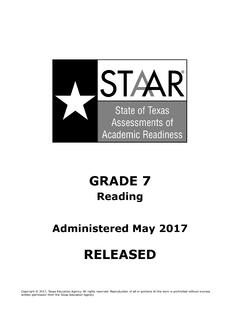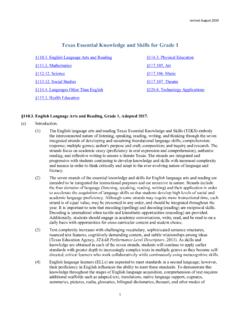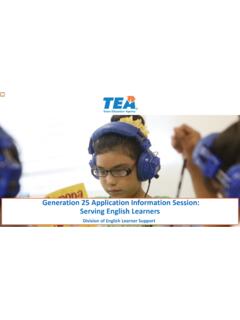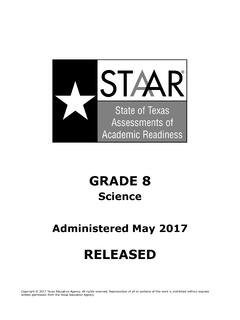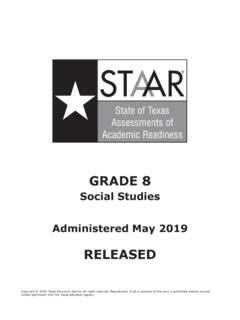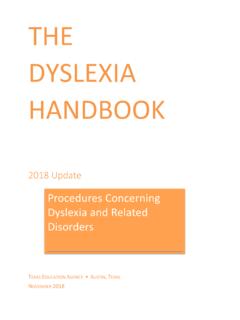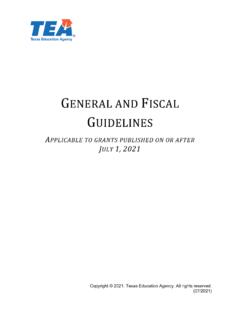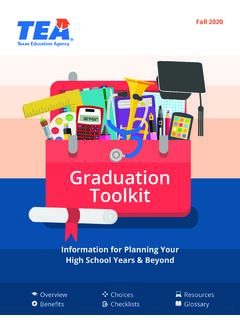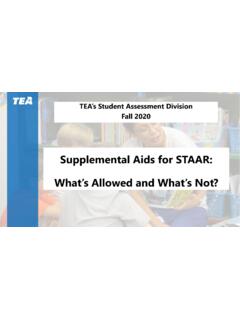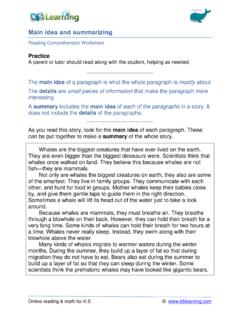Transcription of Texas Essential Knowledge and Skills for Grade 4
1 Revised August 2017 1 Texas Essential Knowledge and Skills for Grade 4 English Language Arts and Reading Mathematics Science Social Studies Languages Other Than English Health Education Physical Education Art Music Theatre Technology Applications English Language Arts and Reading, Grade 4, Beginning with School Year 2009-2010. (a) Introduction. (1) The English Language Arts and Reading Texas Essential Knowledge and Skills (TEKS) are organized into the following strands: Reading, where students read and understand a wide variety of literary and informational texts; Writing, where students compose a variety of written texts with a clear controlling idea, coherent organization, and sufficient detail; Research, where students are expected to know how to locate a range of relevant sources and evaluate, synthesize, and present ideas and information.
2 Listening and Speaking, where students listen and respond to the ideas of others while contributing their own ideas in conversations and in groups; and Oral and Written Conventions, where students learn how to use the oral and written conventions of the English language in speaking and writing. The standards are cumulative--students will continue to address earlier standards as needed while they attend to standards for their Grade . In fourth Grade , students will engage in activities that build on their prior Knowledge and Skills in order to strengthen their reading, writing, and oral language Skills .
3 Students should read and write on a daily basis. (2) For students whose first language is not English, the students' native language serves as a foundation for English language acquisition. (A) English language learners (ELLs) are acquiring English, learning content in English, and learning to read simultaneously. For this reason, it is imperative that reading instruction should be comprehensive and that students receive instruction in phonemic awareness, phonics, decoding, and word attack Skills while simultaneously being taught academic vocabulary and comprehension Skills and strategies.
4 Reading instruction that enhances ELL's ability to decode unfamiliar words and to make sense of those words in context will expedite their ability to make sense of what they read and learn from reading. Additionally, developing fluency, spelling, and grammatical conventions of academic language must be done in meaningful contexts and not in isolation. (B) For ELLs, comprehension of texts requires additional scaffolds to support comprehensible input. ELL students should use the Knowledge of their first language ( , cognates) to further vocabulary development.
5 Vocabulary needs to be taught in the context of connected discourse so that language is meaningful. ELLs must learn how rhetorical devices in English differ from those in their native language. At the same time revised August 2017 2 English learners are learning in English, the focus is on academic English, concepts, and the language structures specific to the content. (C) During initial stages of English development, ELLs are expected to meet standards in a second language that many monolingual English speakers find difficult to meet in their native language.
6 However, English language learners' abilities to meet these standards will be influenced by their proficiency in English. While English language learners can analyze, synthesize, and evaluate, their level of English proficiency may impede their ability to demonstrate this Knowledge during the initial stages of English language acquisition. It is also critical to understand that ELLs with no previous or with interrupted schooling will require explicit and strategic support as they acquire English and learn to learn in English simultaneously.
7 (3) To meet Public Education Goal 1 of the Texas Education Code, , which states, "The students in the public education system will demonstrate exemplary performance in the reading and writing of the English language," students will accomplish the Essential Knowledge , Skills , and student expectations at Grade 4 as described in subsection (b) of this section. (4) To meet Texas Education Code, (h), which states, ".. each school district shall foster the continuation of the tradition of teaching United States and Texas history and the free enterprise system in regular subject matter and in reading courses and in the adoption of textbooks," students will be provided oral and written narratives as well as other informational texts that can help them to become thoughtful, active citizens who appreciate the basic democratic values of our state and nation.
8 (b) Knowledge and Skills . (1) Reading/Fluency. Students read Grade -level text with fluency and comprehension. Students are expected to read aloud Grade -level stories with fluency (rate, accuracy, expression, appropriate phrasing) and comprehension. (2) Reading/Vocabulary Development. Students understand new vocabulary and use it when reading and writing. Students are expected to: (A) determine the meaning of Grade -level academic English words derived from Latin, Greek, or other linguistic roots and affixes; (B) use the context of the sentence ( , in-sentence example or definition) to determine the meaning of unfamiliar words or multiple meaning words; (C) complete analogies using Knowledge of antonyms and synonyms ( , boy:girl as male:____ or girl:woman as boy:_____); (D) identify the meaning of common idioms.
9 And (E) use a dictionary or glossary to determine the meanings, syllabication, and pronunciation of unknown words. revised August 2017 3 (3) Reading/Comprehension of Literary Text/Theme and Genre. Students analyze, make inferences and draw conclusions about theme and genre in different cultural, historical, and contemporary contexts and provide evidence from the text to support their understanding. Students are expected to: (A) summarize and explain the lesson or message of a work of fiction as its theme; and (B) compare and contrast the adventures or exploits of characters ( , the trickster) in traditional and classical literature.
10 (4) Reading/Comprehension of Literary Text/Poetry. Students understand, make inferences and draw conclusions about the structure and elements of poetry and provide evidence from text to support their understanding. Students are expected to explain how the structural elements of poetry ( , rhyme, meter, stanzas, line breaks) relate to form ( , lyrical poetry, free verse). (5) Reading/Comprehension of Literary Text/Drama. Students understand, make inferences and draw conclusions about the structure and elements of drama and provide evidence from text to support their understanding.
